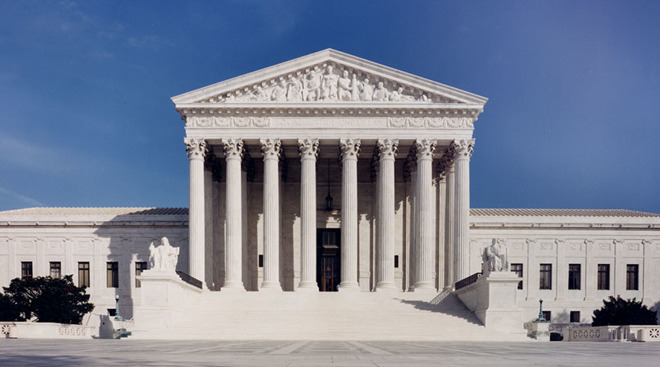In what is sure to be a boon for high-tech companies like Apple and Google, the Supreme Court in a 7-to-2 vote on Tuesday upheld an administrative review process that allows those engaged in patent lawsuits to more easily invalidate questionable IP.
Detailed in a majority opinion (PDF link) written by Justice Clarence Thomas, the Supreme Court confirmed the constitutionality of a patent review structure established by the America Invents Act, saying it does not violate the separation of powers or deny patent holders the right to a federal court trial.
Enacted by Congress in 2011, the law established a system called inter partes review, under which the U.S. Patent and Trademark Office is able to review, and in some cases invalidate, patent claims. The process has been used successfully by Silicon Valley companies as a less expensive method of fending off litigation from so-called "patent trolls."
The case originated from a suit leveled by Oil States International Inc., which leveraged a patent against competitor Greene's Energy Group. Using the IPR procedure, Greene's successfully challenged Oil States, invalidating the patent in the process.
Non-practicing entities often leverage owned or acquired patents to sue for royalties and damages. For some, litigation amounts to a lucrative business model, as large companies facing multiple patent infringement claims often opt for out-of-court settlements rather than pay to fund a protracted court case.
With the 2011 law, an executive branch agency — the PTO through its Patent Trial and Appeal Board — is able to adjudicate patent claims in an action similar to a court trial. The review mechanism was established in part to dissuade what some consider abusive patent litigation, and to allow the PTO a chance to rectify mistakes.
According to estimates from Apple, which is constantly attacked by patent holdings firms, a PTAB review costs approximately $350,000, while holding the same proceeding in district court could reach $3 million, reports Reuters.
Opponents of the measure, including pharmaceutical companies and independent inventors, say the procedure violates the Constitution by stepping on the separation of powers, effectively replacing federal courts and denying patent holders the right to a jury trial, reports The New York Times.
Thomas in the decision said IPR is an extension of the patent grant process and therefore does not breach constitutional protections. Further, the majority opinion views patents as a public right, not a private right that must be adjudicated by a federal court.
"Inter partes review falls squarely within the public-rights doctrine. The decision to grant a patent is a matter involving public rights," he wrote. "Inter partes review is simply a reconsideration of that grant, and Congress has permissibly reserved the PTO's authority to conduct that reconsideration.
Justices Samuel A. Alito Jr., Stephen G. Breyer, Ruth Bader Ginsburg, Elena Kagan, Anthony M. Kennedy and Sonia Sotomayor agreed. Chief Justice John Roberts and Justice Neil Gorsuch dissented.
In a separate decision on Tuesday, the Supreme Court voted 5-to-4 (PDF link) to refine the IPR process. Writing for the majority, Justice Gorsuch said the PTAB must issue a ruling on all challenges to a specific patent, not only select claims. As noted by Bloomberg, the adjustment forces patent challenges to be more precise.
The PTAB has fielded more than 7,000 petitions since 2012, with proceedings cancelling some 1,300 patents. A bulk of the filings related to high-tech patents, many of which were leveraged against Silicon Valley companies in attempts to extract royalties.
Apple is no stranger to "patent trolls," regularly facing off against NPEs like VirnetX, Uniloc, Soverain Software, Acacia Research and others.
VirnetX was just this month granted $502.6 million in damages from Apple after a jury found the iPhone maker's secure communications technology to have infringed on three owned patents. That award joins another $439.7 million victory over similar patents. Those wins could soon be thrown out, as Apple moved for an IPR in 2016 that ultimately invalidated four patents-in-suit. VirnetX's fortune now rests on its appeal of the PTAB decision.
 Mikey Campbell
Mikey Campbell







-m.jpg)






 Brian Patterson
Brian Patterson
 Charles Martin
Charles Martin


 Malcolm Owen
Malcolm Owen
 William Gallagher
William Gallagher
 Christine McKee
Christine McKee
 Marko Zivkovic
Marko Zivkovic









8 Comments
Patents themselves are a government-issued monopoly to protect the companies from having to compete with others using the results of research without remuneration. It is a construct to try to encourage companies into research and costly development - with the promise that they will have a monopoly for a period of time. If a patent is obvious or even a natural evolution then the government should not be handing out these monopolies since they provide little benefit. It is a compromise with respect to a market economy since monopolies are the antithesis of a properly functioning market economy.
If they changed the law where you had to either show your product on the market or how you are trying to bring it to market and here’s all the work you have done, it would eliminate those who buy up patents for no other reason than to troll and sue others. It’s immoral and it should be and could be outlawed easily, if they wanted. They also should investigate that judge and courtroom in south east Texas, the fellow who is related to some of those lawers who win those patent troll cases there.
That's the first time I've seen it written "high-tech", I thought it was always abbreviated "hi-tech". :D